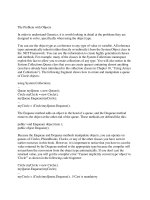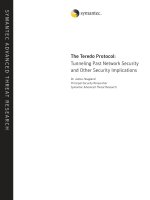In 1999, LBNL asked the area s cellular carriers to propose a solution to the problem cingular wireless (previously cellular one and AT t wireless) p
Bạn đang xem bản rút gọn của tài liệu. Xem và tải ngay bản đầy đủ của tài liệu tại đây (101.82 KB, 2 trang )
Lawrence Berkeley National Laboratory
Discovers Pervasive Cellular Coverage
CASE STUDY
CHALLENGE
Lawrence Berkeley National Laboratory (LBNL) has been a leader in
science and engineering research for 75 years. Located on a 200-acre
site in the hills above the University of California's Berkeley campus
and overlooking San Francisco Bay, Berkeley Lab is the oldest of the
U.S. Department of Energy's National Laboratories. LBNL was founded
by Ernest O. Lawrence, Nobel prize-winning inventor of the cyclotron,
which pioneered new areas in atomic and subatomic research.
LBNL’s main site now consists of more than 100 buildings where some
3,800 research, engineering, student, and administrative personnel
conduct unclassified scientific research in a variety of disciplines. The lab’s
research areas include fundamental studies of the universe, quantitative
biology, nanoscience, new energy systems and environmental solutions,
and the use of integrated scientific computing as a tool for discovery.
The Lab is also home to four DOE national user facilities.
The problem is that the hill-and-valley topography of the site leads to
inconsistent and sometimes nonexistent cellular coverage: buildings on
hilltops receive good coverage, while buildings located in the valleys (and
sometimes built into hillsides) have little or no coverage. “It’s a large
campus, and many of our employees have offices in one location and
then spend a lot of time in labs at another location, so cellular phones
had become the primary method of communications,” said Stephen
Nobles, a project manager in the IT Infrastructure department at LBNL.
“We had to find a way to make sure those phones worked.”
In 1999, LBNL asked the area’s cellular carriers to propose a solution to the problem. Cingular Wireless
(previously Cellular One and AT&T Wireless) proposed installing an InterReach in-building wireless
system. After the IT staff determined that the in-building system wouldn’t interfere with sensitive
scientific instruments such as electron microscopes, Cingular got the go-ahead to install it.
DEPLOYMENT
The plan was to roll out the system gradually, focusing on the buildings with the greatest need first and
then moving ahead. Building sizes ranged from portable trailers to facilities of 150,000 square feet. Not
all buildings needed in-building systems, as some had coverage from nearby outdoor cell towers. The
initial deployment covered ten buildings. “The deployment wasn’t disruptive at all,” says Nobles. “It was
pretty painless.”
Cingular first deployed a micro base station in LBNL’s data center along with a Main Hub, Expansion
Hubs, Remote Access Units (RAUs), and antennas. Today, the deployment spans 10 buildings and
includes 4 Main Hubs, 13 Expansion Hubs, and about 100 antennas. The Main Hubs are linked by
fiber with the Expansion Hubs, and then wireless signals are carried to the RAUs and antennas via
Cat-5 cabling.
BENEFITS
When the system went live, users discovered that their phones worked in many places where they
hadn’t worked before.
“We found how much users liked it when the system had an outage at one point,” says Nobles.
“People had become accustomed to it, and we really heard from them when it stopped working.
I came in one Monday morning and got one call after another about how the service wasn’t working.”
While most of the users rely on voice or text messaging, some are also using Cingular data cards in their
laptops to get Internet access over Cingular’s EDGE data network.
Case Study
FUTURE
Based on its success so far, LBNL plans to continue rolling out the system to more buildings where
coverage needs enhancement, up to a total of about 30 buildings. Currently underway is a newly-built,
100,000-square foot Molecular Foundry, a nanoscience facility that will house some 150 workers. The
finished building was dedicated in March, 2006. In addition, Cingular is also planning to wire a cluster
of five mobile office units that house the facilities engineering and support staff.
Better coverage means more productive communications between researchers, staff, and students at
America’s oldest laboratory campus serving the U.S. Department of Energy. LBNL is discovering a way to
provide reliable, high-performance cellular links for its workers.
Website: www.adc.com
From North America, Call Toll Free: 1-800-366-3891 • Outside of North America: +1-952-938-8080
Fax: +1-952-917-3237 • For a listing of ADC’s global sales office locations, please refer to our website.
ADC Telecommunications, Inc., P.O. Box 1101, Minneapolis, Minnesota USA 55440-1101
Specifications published here are current as of the date of publication of this document. Because we are continuously
improving our products, ADC reserves the right to change specifications without prior notice. At any time, you may
verify product specifications by contacting our headquarters office in Minneapolis. ADC Telecommunications, Inc.
views its patent portfolio as an important corporate asset and vigorously enforces its patents. Products or features
contained herein may be covered by one or more U.S. or foreign patents. An Equal Opportunity Employer
105902AEAE 3/08 Original © 2008 ADC Telecommunications, Inc. All Rights Reserved









